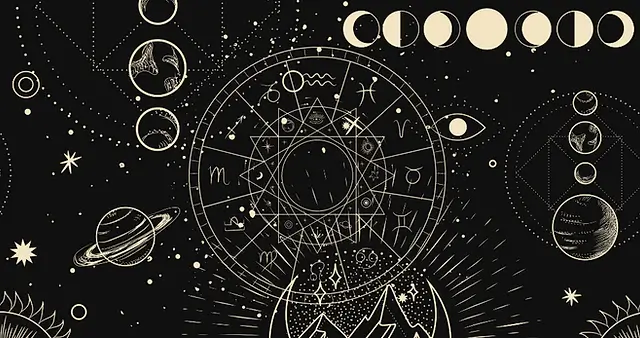Astrology: Connecting Cosmic Patterns To Everyday Life

In today’s world, astrology has seen a resurgence in popularity, connecting people to the cosmos in a deeply personal way. Its appeal lies in its ability to provide insights into personality traits, life events, and even future possibilities. People turn to their daily horoscope for guidance in daily decision-making, find comfort in the stability of zodiac signs, and seek an understanding of the complexities of human relationships and behaviors. Astrology offers a unique perspective, blending ancient wisdom with modern life, making it relevant and appealing in our fast-paced world.
Introduction to the Fundamentals of Astrology
Zodiac signs are the cornerstone of astrological practice. These 12 signs, each covering 30 degrees of the celestial sphere, correspond to different months of the year. They are often the first step in understanding astrology’s role in personal lives. Each sign is associated with specific characteristics and behaviors, influencing how individuals perceive the world and interact with others. Understanding these signs helps in gaining deeper insights into personal strengths, weaknesses, and how one relates to others.
In astrology, planets play a significant role, with each celestial body representing different aspects of human life. For example, Venus governs love and beauty, while Mars influences energy and aggression. The positions and movements of these planets at the time of one’s birth are said to shape personality traits, life events, and even future tendencies. This planetary influence is a key aspect of creating a personal astrology profile.
An astrological chart, or birth chart, is a map of where all the planets were in their journey around the Sun at the exact moment of one’s birth. These charts are complex and can provide an in-depth understanding of an individual’s personality traits, potential life paths, and even challenges they might face. Interpreting these charts requires knowledge of the astrology signs, planetary positions, and how they interact with each other.
Astrology signs dates are fundamental in creating an astrological chart. Each of the 12 zodiac signs corresponds to a specific time frame in the calendar year. For example, Aries covers March 21 to April 19, while Taurus spans April 20 to May 20. Knowing these dates helps in identifying one’s sun sign, which is a significant factor in understanding personal astrology compatibility and character traits.
Historical Evolution of Astrology
Astrology’s roots can be traced back to ancient civilizations, where it began as a blend of astronomical observation and mythological symbolism. Early astrologers in civilizations like Babylon, Egypt, and Greece observed celestial patterns and linked them to earthly events. This connection between the heavens and human life laid the foundation for astrology as we know it. It was a respected field, with astrologers often serving as advisors to rulers and playing significant roles in guiding societal decisions.
Throughout history, astrology has been shaped by various cultures and traditions, each adding its unique perspective. In China, astrology was intertwined with Taoist philosophy and focused on balancing cosmic forces. In India, Vedic astrology or Jyotish formed an integral part of spiritual and daily life. Western astrology, influenced by Hellenistic culture, introduced the zodiac signs and planetary aspects that are commonly used today. Each culture’s approach to astrology offers insights into how ancient societies understood their place in the universe.
The transition from ancient to modern astrology was marked by significant changes, especially during the Renaissance. This era saw a revival of interest in classical learning and knowledge, including astrology. Astrologers began to use more mathematical and scientific methods to make predictions, shifting astrology closer to its current form. However, the rise of modern science in the following centuries led to a decrease in astrology’s scientific credibility, transforming it into more of a psychological and spiritual guide than a predictive tool.
Astrology has played a role in historical events and decisions throughout the centuries. Rulers and leaders often consulted astrologers to choose auspicious dates for battles, coronations, and other significant events. For instance, the timing of the Norman Conquest and the crowning of Queen Elizabeth I were influenced by astrological predictions. This historical influence highlights astrology’s once pivotal role in shaping world events and decisions.
Astrology in Understanding Personalities
Each of the twelve zodiac signs embodies a unique set of characteristics and traits, providing a framework for understanding diverse personalities. Understanding these traits helps in comprehending not only personal inclinations and behaviors but also in appreciating the diverse personalities encountered in daily life.
Astrology posits that celestial alignments at the time of birth influence individual behaviors and tendencies. The positions of planets, the sun, and the moon with the zodiac signs play a crucial role in shaping one’s temperament and disposition. Here is a comparison between Sun, Moon, and Rising Signs:
- Sun Sign: This represents your core personality, ego, and who you are at your core.
- Moon Sign: Reflects your emotional inner world, instincts, and how you respond to feelings.
- Rising Sign (or Ascendant): Relates to the image you project to the world and first impressions.
These three components together create a more comprehensive picture of one’s personality. The Sun Sign is often seen as the primary indicator of one’s nature, but the Moon and Rising signs provide depth, revealing how emotions and external behaviors interact with the core self.
Zodiac compatibility plays a significant role in astrology, especially in the context of relationships. It involves comparing the astrological signs of individuals to determine potential harmony and challenges in their interactions. For instance, Air signs like Gemini, Libra, and Aquarius often vibe well with Fire signs like Aries, Leo, and Sagittarius, due to their complementary natures. Understanding these compatibilities can aid in navigating relationships, offering insights into potential dynamics and areas for growth or caution.
As we move forward, the evolution of astrology remains dynamic. It adapts and integrates with technological advancements and changing societal perspectives. Online platforms and digital tools have made astrology more accessible, allowing more people to explore its wisdom. The growing interest in spirituality and self-help practices continues to fuel astrology’s relevance. Despite criticisms and skepticism, astrology maintains its appeal, offering a unique blend of ancient wisdom and modern understanding. It stands as a testament to humanity’s enduring quest for knowledge and insight into the complexities of life and the universe.





